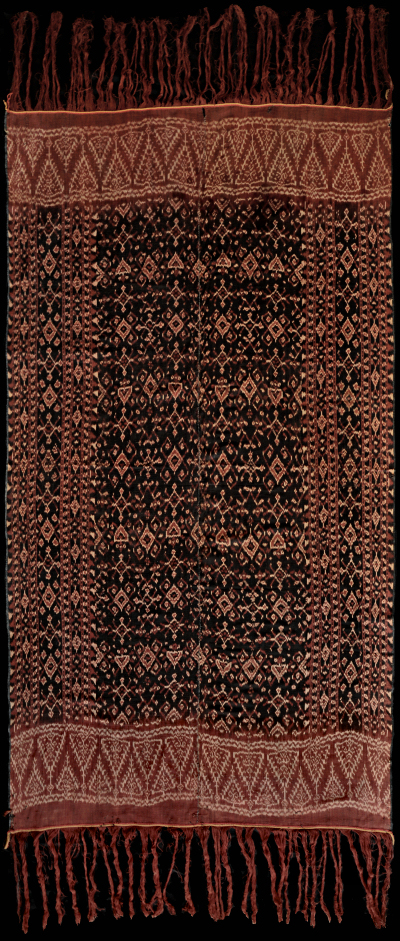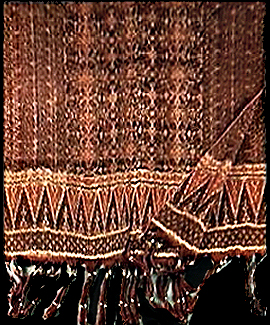| |
 
 | | | |
239 Flores Group, Ende
Semba (man's shawl) 
| | Locale: | Ende proper, most likely, given the stature of the man for whom this was intended. | | Period: | 19th or early 20th c. (before 1930) | | Yarn: | Cotton, hand-spun, fine | | Technique: | Warp ikat | | Panels: | 2 | | Size: | 92 x 185 cm (3' 0" x 6' 0") LW: 2.01 | | Weight: | 580 g (20.5 oz), 341 g/m2 (1.12 oz/ft2) | | Design: | Old luka semba, for man of the nobility. The whole lay-out is a clear emulation of patola, with distinct and elaborate tumpal borders. Most distinctive are the wide lateral borders, a feature that went out of style in the early 20th; according to Hamilton by 1930. From then on, the midfield ran all across the width of the cloth. | | Comment: | The presence of lateral borders, and the high degree of intricacy marks this as 19th or early 20th C., and as masterpiece. It makes the impression of having been kept stored away as a pusaka for many years. Few known cognates of this quality in museum collections. There appears to be a clear correlation between age and degree of intricacy of the design, which was simplified over time. Found on a Dutch attic by new owners of the house and sold on internet among sundry household items. A few very small holes, and one old repair: an area the size of a small fingerprint darned in grey. Overall state of preservation excellent for its age. | | Background: | Chapters on Flores Group and Ende. | | Compare: | 161 199 238 | | Sources: | Similar to an equally intricate pre-1890 semba with elaborate lateral borders in depot of Rijksmuseum Volkenkunde, shown below, which is not accessible via online collection search, Nr. 804-172. Similar another example in Rotterdam Wereld, WM-71377, which, oddly, is filed as Sumba. Also similar to pre-1940 example in Tropenmuseum, Nr. 1772-1150, but considerably more intricate; and to early semba in British Museum, Nr. AS1990.01.20, but more intricate. Similar to circa 1900 Ende semba in Rautenstrauch-Joest Museum, Nr. 36556, depicted in Khan Majlis, Indonesische Textilien, Wege zu Goettern und Ahnen, Abb. 373. Similar to unidentified example in Bezemer, Indonesisches Kunstgewerbe, Fig. 51.
 | | |

©Peter ten Hoopen, 2025
All rights reserved.
|
|


